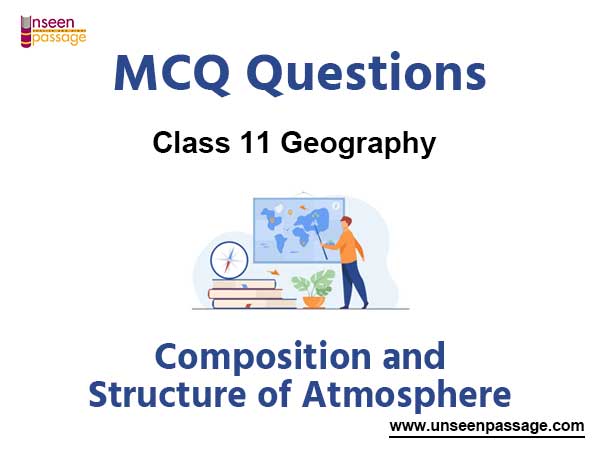Composition and Structure of Atmosphere MCQs Class 11 Geography
Please refer to Chapter 8 Composition and Structure of Atmosphere MCQs Class 11 Geography with answers below. These multiple-choice questions have been prepared based on the latest NCERT book for Class 11 Geography. Students should refer to MCQ Questions for Class 11 Geography with Answers to score more marks in Grade 12 Geography exams. Students should read the chapter Composition and Structure of Atmosphere and then attempt the following objective questions.
MCQ Questions Class 11 Geography Chapter 8 Composition and Structure of Atmosphere
Composition and Structure of Atmosphere MCQ Class 11 Geography provided below covers all important topics given in this chapter. These MCQs will help you to properly prepare for exams.
Question. Which gas is found as a trace in the atmosphere?
a. oxygen
b. nitrogen
c. carbon dioxide
d. xenon
Answer
D
Question. Ionosphere is located between
a. 80 and 400 km.
b. 80 and 500 km.
c. 40 and 400 km.
d. 40 and 200 km.
Answer
A
Question. What is the % of nitrogen in the atmosphere?
a. 20.95%
b. 78.08%
c. 20%
d. 80%
Answer
B
Question. Name the gas which is useful for plants
a. oxygen
b. carbon dioxide
c. argon
d. hydrogen
Answer
B
Question. Which layer of atmosphere has electronically charged particles?
a. Mesosphere
b. Ionosphere
c. Troposphere
d. Stratosphere
Answer
B
Question. Agents of fog formation do not include
a. High relative humidity
b. Diurnal temperatures of short ranges
c. Winter season
d. Rapid radiation
Answer
C
Question. Why the Earth is having its own atmosphere?
a. Winds
b. Clouds
c. Gravity
d. Rotation of the Earth
Answer
C
Question. The equipment to measure atmospheric humidity is
a. Anemometer
b. Psychrometer
c. Hydrometer
d. Lysimeter
Answer
B
Question. Excess carbon dioxide in the atmosphere due to pollution will cause
a. Earth’s temperature to rise
b. Earth’s temperature to fall
c. Decrease in weather phenomenon
d. Ozone layer to become thicker
Answer
A
Question. Chief elements of the atmosphere are
a. wind
b. temperature
c. pressure
d. all of them
Answer
D
Question. Which gas is present in large amount in the atmosphere?
a. oxygen
b. hydrogen
c. nitrogen
d. carbon dioxide
Answer
C
Question. Atmospheric elements are controlled by
a. latitude
b. altitude
c. land
d. all of them
Answer
D
Question. The zone separating troposphere from stratosphere is known as
a. tropopause
b. stratopause
c. mesopause
d. none of these
Answer
A
Question. Oxygen gas is in negligible quantity at the height of atmosphere:
a. 90 km
b. 120 km
c. 100 km
d. 150 km
Answer
B
Question. Which gas acts as a filter and protects us from the ultra violet rays?
a. oxygen
b. nitrogen
c. ozone
d. carbon dioxide
Answer
C
Question. Which one is the variable gas in the atmosphere?
a. carbon dioxide
b. water vapour
c. dust particles
d. smoke
Answer
B
Question. The increase in the volume of carbon dioxide for the past few decades is mainly due to
a. deforestation
b. climate change
c. atmospheric composition
d. burning of fossil fuels
Answer
D
Question. The mesosphere lies above the
a. troposphere
b. stratosphere
c. ionosphere
d. exosphere
Answer
A
Question. It is an element of atmosphere
a. Tides
b. Pressure
c. Water currents
d. Waves
Answer
B
Question. The equipment to measure atmospheric humidity is
a. Anemometer
b. Psychrometer
c. Hydrometer
d. Lysimeter
Answer
B
Question. The upper limit of mesosphere is known as
a. tropopause
b. mesopause
c. stratopause
d. exopause
Answer
B
Question. Atmospheric elements are controlled by
a. latitude
b. altitude
c. land
d. all of them
Answer
D
Question. Which gas is essential for breathing?
a. nitrogen
b. oxygen
c. carbon dioxide
d. none of these
Answer
B
Question. Atmospheric elements are controlled by
a. latitude
b. altitude
c. land
d. all of them
Answer
D

